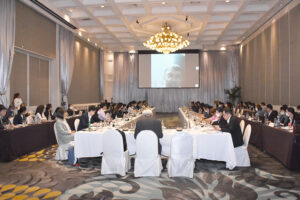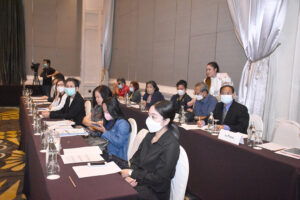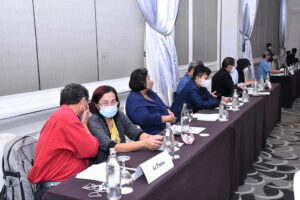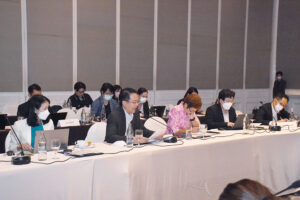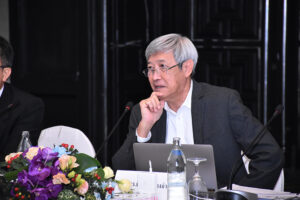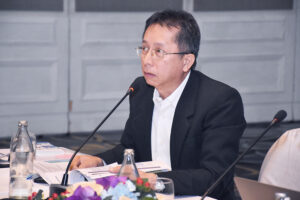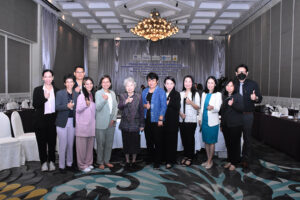
The National Centre for Genetic Engineering and Biotechnology (BIOTEC) of the National Science and Technology Development Agency (NSTDA) expect that the results of their study of the “Enhancing Climate Resilience in Thailand’s Local Food System” project will lead to actionable policy recommendations for building food system resilience to climate change and other crises, thereby creating food security for the country on a sustainable basis.
The study, which was conducted in partnership with Ubon Ratchathani University and the International Joint Research Center On Food Security (IJC-FOODSEC), focused on two key areas of the local food system: urban/suburban areas (Bangkok, Nonthaburi and Nakhon Pathom) and rural/agricultural areas, namely Ubon Ratchathani, as the province is a major food production source and has long faced flooding problems.
BIOTEC-NSTDA also organised a dissemination workshop to brainstorm ideas from all parties concerned, the results of which will be proposed to the National Food Committee.

Dr. Wonnop Visessanguan, BIOTEC’s Executive Director, said that Thailand’s food system is currently facing greater climate variability and a high risk of climate change combined with multiple crises arising from the global economic slowdown, the Covid-19 pandemic, and geopolitical fragmentation. These factors make the Thai food system vulnerable, especially the local food system which relies on farmers and small business owners who still have a lack of access to resources, funding sources, and essential knowledge for resilience to changes.
To address these issues, the Foreign, Commonwealth and Development Office (FCDO), South Asia Research Hub in collaboration with the British Embassy in Bangkok, granted funding to BIOTEC-NSTDA for the project. BIOTEC’s Policy and Biosafety Unit Division (PBD) collaborated with Ubon Ratchathani University, and the International Joint Research Center On Food Security (IJC-FOODSEC), which is a trilateral collaboration between BIOTEC, Thammasat University and Queen’s University Belfast, to implement the “Enhancing Climate Resilience in Thailand’s Local Food System” project.
The project aims to enhance climate resilience in Thailand’s local or community food systems through policies, technology and innovations, all of which will be vital tools to build sustainable food security.
“This project outputs will lead to collaboration between Thailand and the UK for joint development, leveraging science, technology and innovation as well as upgrading Thailand’s sustainable food system and achieving the UN SDGs in the near future,” BIOTEC’s executive director noted.

Kulwarang Suwanasri, BIOTEC’s Policy researcher at the Policy Study and Biosafety Unit (PSS), the Policy and Biosafety Unit Division (PBD), added that one of the key objectives of the study is to foster understanding about the role of technology, innovation, policy, and measures as well as cooperation from all parties involved in entire the supply chain. The research team is determined to develop a policy framework and strategy for enhancing climate resilience in the local food system allowing all parties to have equal access to food and nutrition.
According to Global Food Security Index (GFSI), Thailand’s food security was ranked at a good level in 2021 with an average score of 64.5 out of 100. However, some Thai households and especially vulnerable groups, still have nutritional problems with inappropriate macronutrients and inadequate nutrients made worse by the impacts of climate change such as drought and flooding. These cause risks to the security of the local food system, which will eventually affect food inadequacy, food accessibility, and food quality and safety. Inevitably, the local food system problems will lead to social problems including poverty, which is recognised as a critical factor in fuelling migration.
In addition, the study outcomes also indicated policy gaps important to the current climate resilience including that of Thailand’s local food system. Thailand has set up the National Food Committee, but there is a lack of management structure and a unit to clearly drive policies at the local level. So far, climate resilience in the local food system has not been incorporated into the provincial food development plan. Moreover, Thailand has no national or local plans to create food security or prepare for natural disasters, which are occurring more frequently and with greater intensity.
In the field of technology development and transfer, the study found that area-based research, which is crucial to building Thailand’s food security, has not been prioritised as expected to receive research funding in the field of agriculture and food. In addition, the research on technology and innovation to fight against climate change including climate-tolerant plant breeding, prediction and warning of climate change impacts are not adequate nor keeping pace with the changes. More intensive research is thus needed.
On the issue of building the capacity of all actors in the food system, the study showed that knowledge and capacity of Thai farmers remain a key problem for climate resilience. Most of them are still familiar with traditional farming practices and only 10% of the total of Thai farmers have been able to adopt modern technologies. Rising temperatures could lead to an increased risk of spoilage and food-borne pathogens due to inappropriate storage and transportation systems, making traceability a critical issue that trade partners and markets require to improve its efficiency.
In terms of financial support, the Bank for Agriculture and Agricultural Cooperatives (BAAC) is the main financial institute supporting farmers with low loan interest rates. The bank has issued over 6 billion baht of green bonds for environment conservation since 2020. Moreover, BAAC provides other financial measures that enable farmers to gain access to technology and innovation for greater production efficiency.
Participation of all actors in the food system and social protection system through Public-Private partnerships (PPPs) is key to enhancing climate resilience in the local food system, particularly the private sector and NGOs. However, the study indicates that the most effective participation is in cash crops.
“Following the study outcomes, the research team is developing policy recommendations to enhance local food system resilience with an aim of developing and leveraging science, technology and innovation. We expect that this is the first step in encouraging awareness of the importance of policy issuance to build adaptation and resilience of Thailand’s food system to multiple crises. This requires cooperation from all actors in the food system covering public, private and civil society sectors if we are to jointly escalate food system development in terms of policy and action,” Kulwarang concluded.




